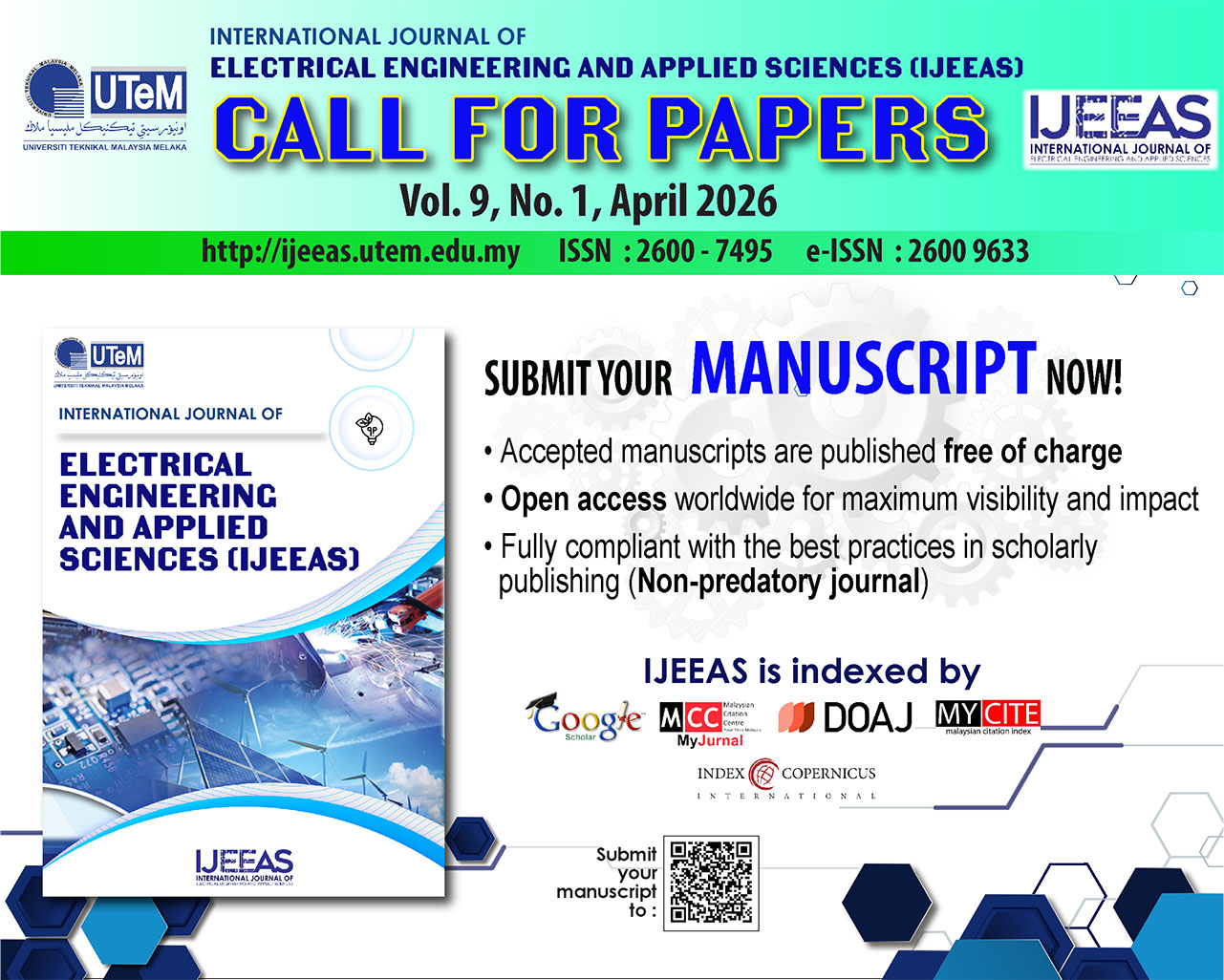Artificial Bee Colony Optimization Algorithm with Flexible Manipulator System
Abstract
This paper presents the Artificial Bee Colony (ABC) optimization algorithm with application to flexible manipulator system (FMS). The aim of the algorithm is to find the best possible tuning parameter that can provide accurate angle trajectory of FMS. Five performance criteria have been used as an objective function of this problem where several conditions with different ABC parameters setting are set to determine which performance criteria is most suitable in tuning the PID controller in order to obtain the best FMS performance. The results show that the ABC with Root Mean Square Error (RMSE) as performance criteria outperforms the ABC with other performance criteria and it able to tune the PID controller of FMS to the desired hub angle trajectory.
Downloads
References
G. Zhu and S. Kwong, “Gbest-guided artificial bee colony algorithm for numerical function optimization,” Appl. Math. Comput., vol. 217, no. 7, pp. 3166–3173, 2010.
C. Zhang, D. Ouyang, and J. Ning, “An artificial bee colony approach for clustering,” Expert Syst. Appl., vol. 37, no. 7, pp. 4761–4767, 2010.
M. R. Hashim, A. K. Hyriel, M. O. Tokhi, “Optimal tuning of PD controllers using modified artificial bee colony algorithm,” Journal of Telecommunocation,Electronic and Computer Engineering, vol. 10, no. 2-8, p. 67-70, 2018.
E. Dilmen, S. Yilmaz, and S. Beyhan, An Intelligent Hybridization of ABC and LM Algorithms With Constraint Engineering Applications, 1st ed. Elsevier Inc., 2017.
Z. Ye, Z. Hu, H. Wang, and H. Chen, “Automatic threshold selection based on artificial bee colony algorithm,” 2011 3rd Int. Work. Intell. Syst. Appl. ISA 2011 - Proc., 2011.
S. Sukpancharoen, T. R. Srinophakun, and J. Hirunlabh, “The application of a mixed coding approach to address mixed integer linear and non-linear programming problems using Particle Swarm Optimization (PSO) with an Artificial Bee Colony (ABC) Algorithm,” ACM Int. Conf. Proceeding Ser., pp. 78–83, 2018.
D. W. Lim, E. H. Kim, and Y. K. Lee, “Anti-vibration PID control for a robot manipulator experiments,” URAI 2011 - 2011 8th Int. Conf. Ubiquitous Robot. Ambient Intell., pp. 724–726, 2011.
Z. Mohamed, J. M. Martins, M. O. Tokhi, J. Sá da Costa, and M. A. Botto, “Vibration control of a very flexible manipulator system,” Control Eng. Pract., vol. 13, no. 3, pp. 267–277, 2005.
B. A. Md Zain, M. O. Tokhi, and S. F. Toha, “PID-based control of a single-link flexible manipulator in vertical motion with genetic optimisation,” EMS 2009 - UKSim 3rd Eur. Model. Symp. Comput. Model. Simul., pp. 355–360, 2009.
M. R. Hashim and M. O. Tokhi, "Greedy spiral dynamic algorithm with application to controller design," 2016 IEEE Conference on Systems, Process and Control (ICSPC), Bandar Hilir, 2016, pp. 29-32.
M. O. Sharma, S. K. and Tokhi, “Dynamic modelling of a flexible manipulator,” Proc. 2000JUSFA ASME 2000 Japan-USA Symp. Flex. Autom. 23-26 July, vol. 19, no. 4, p. CDROM, 2000.
M. Zulhilmi, “VIBRATION CONTROL OF SINGLE LINK FLEXIBLE MANIPULATOR BY USING NEURAL NETWORK,” no. June, 2013.
K. S. Rao and R. Mishra, “Comparative study of P, PI and PID controller for speed control of VSI-fed induction motor,” vol. 2, no. 2, pp. 2740–2744, 2014.
K. Krishnan and G. Karpagam, “Comparison of PID Controller Tuning Techniques for a FOPDT System,” Int. J. Curr. Eng. Technol., vol. 4, no. 4, pp. 2667–2670, 2014.
Downloads
Published
How to Cite
Issue
Section
License
Authors who publish with this journal agree to the following terms:
- Authors retain copyright and grant the journal right of first publication with the work simultaneously licensed under a Creative Commons Attribution License that allows others to share the work with an acknowledgement of the work's authorship and initial publication in this journal.
- Authors are able to enter into separate, additional contractual arrangements for the non-exclusive distribution of the journal's published version of the work (e.g., post it to an institutional repository or publish it in a book), with an acknowledgement of its initial publication in this journal.
- Authors are permitted and encouraged to post their work online (e.g., in institutional repositories or on their website) prior to and during the submission process, as it can lead to productive exchanges, as well as earlier and greater citation of published work (See The Effect of Open Access).







